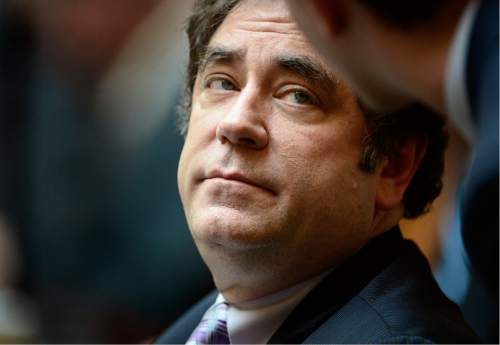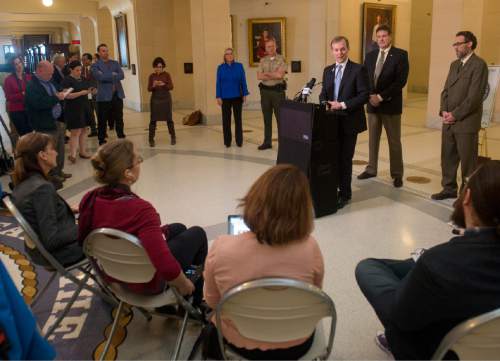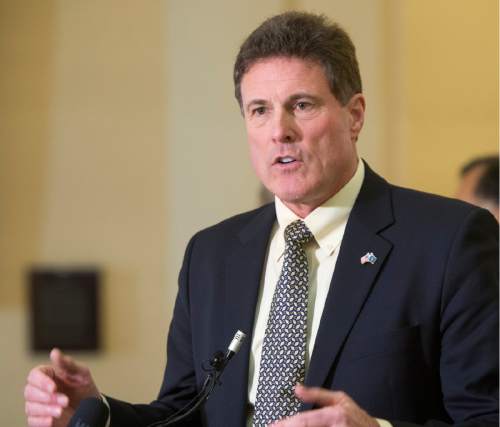This is an archived article that was published on sltrib.com in 2016, and information in the article may be outdated. It is provided only for personal research purposes and may not be reprinted.
After years of disagreement on Medicaid expansion, the Utah House finally approved legislation Monday that would provide health-care coverage to the chronically homeless, mentally ill and those recently released from prison.
Representatives passed HB437 on a 55-17 vote, and sent it to the Senate. It would provide coverage to about 16,000 people — while other more generous plans defeated last year would have covered about 125,000.
House Majority Leader Jim Dunnigan, R-Taylorsville, sponsor of the bill, said, "We're addressing and providing a hand up for the homeless and those who have been involved in our criminal-justice system or those with behavioral-health needs. I think this is the right policy and the appropriate step."
Democrats attacked it for covering too few people compared to full Medicaid expansion or other plans proposed previously by Gov. Gary Herbert and the Senate — but blocked in the House.
"Do I vote yes and support the 16,000 individuals who will be covered, or do I stand with the 94,000-plus people that we are leaving behind?" asked Rep. Sandra Hollins, D-Salt Lake City.
Rep. Marie Poulson, R-Cottonwood Heights, said, "I feel like King Solomon having to divide the baby."
"I do resent being forced into this Sophie's Choice, having to choose which of two children should be left behind … especially when I know there is a more beneficial and fiscally responsible option that we have at our disposal," said Rep. Rebecca Chavez-Houck, D-Salt Lake City.
The plan chooses to leave tens of millions of dollars on the table that is offered through federal matches available through "Obamacare," and sets qualifying income levels so low that it may "provide a disincentive for them [recipients] to move forward for self sufficiency."
Dunnigan's plan would cost $30 million in state dollars and utilize $70 million in federal funds. Utah hospitals, which now bear the cost of providing emergency room coverage for the uninsured and would benefit from having those patients covered, agreed to pay $13.5 million of the state's share.
House Republicans hailed Dunnigan's plan as avoiding potential runaway costs of other plans which have no caps regarding the number of people covered.
"Last year we had an open-ended entitlement program before us," said Rep. Norm Thurston, R-Provo. "This year we have a limited-scope program that addresses the needs of the most vulnerable among us. And it does it in a way that is sustainable."
Rep. Jake Anderegg, R-Lehi, said, "We do have a moral obligation to this group of people. It may not be everything that everyone would want. But this is a good first, measured step."
Rep. Ed Redd, R-Logan, is a doctor who treats the mentally ill in jail. He said he often is able to stabilize these patients, only to see them released with nowhere to go to continue treatment — and they soon return to jail. He said the bill could end that revolving door.
"We will fund this, and we will know what our costs will be," said Rep. Francis Gibson, R-Mapleton. "Every single year we will know how many people we will serve."
The bill has received the support of Salt Lake City Mayor Jackie Biskupski and Salt Lake County Mayor Ben McAdams.
In an earlier hearing, Keith McMullin, an emeritus general authority of the LDS Church and president of the church-owned Deseret Management Corp. — who was not speaking officially for the church — said a "society grows and prospers as it attends to those who are most vulnerable."
After the vote, House Democratic leader Brian King, D-Salt Lake City, denounced the bill and the self-congratulatory speeches.
"Shame on anyone saying this bill — a bill that excludes thousands of families and individuals, working people trying to make ends meet in our state — is the only option. This is not the only option. This is not the best option. This is not the right option."
All 11 Democrats present voted against the bill, joined by six Republicans.







